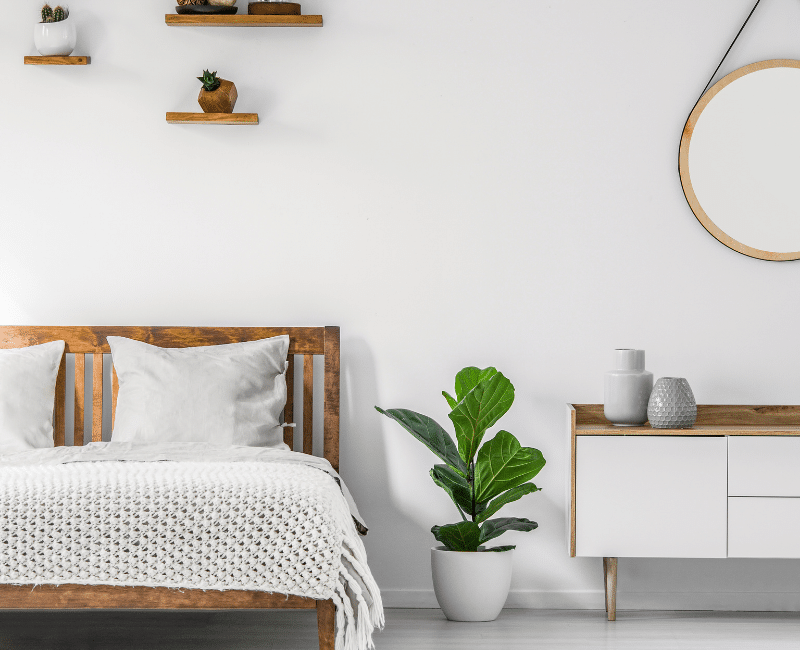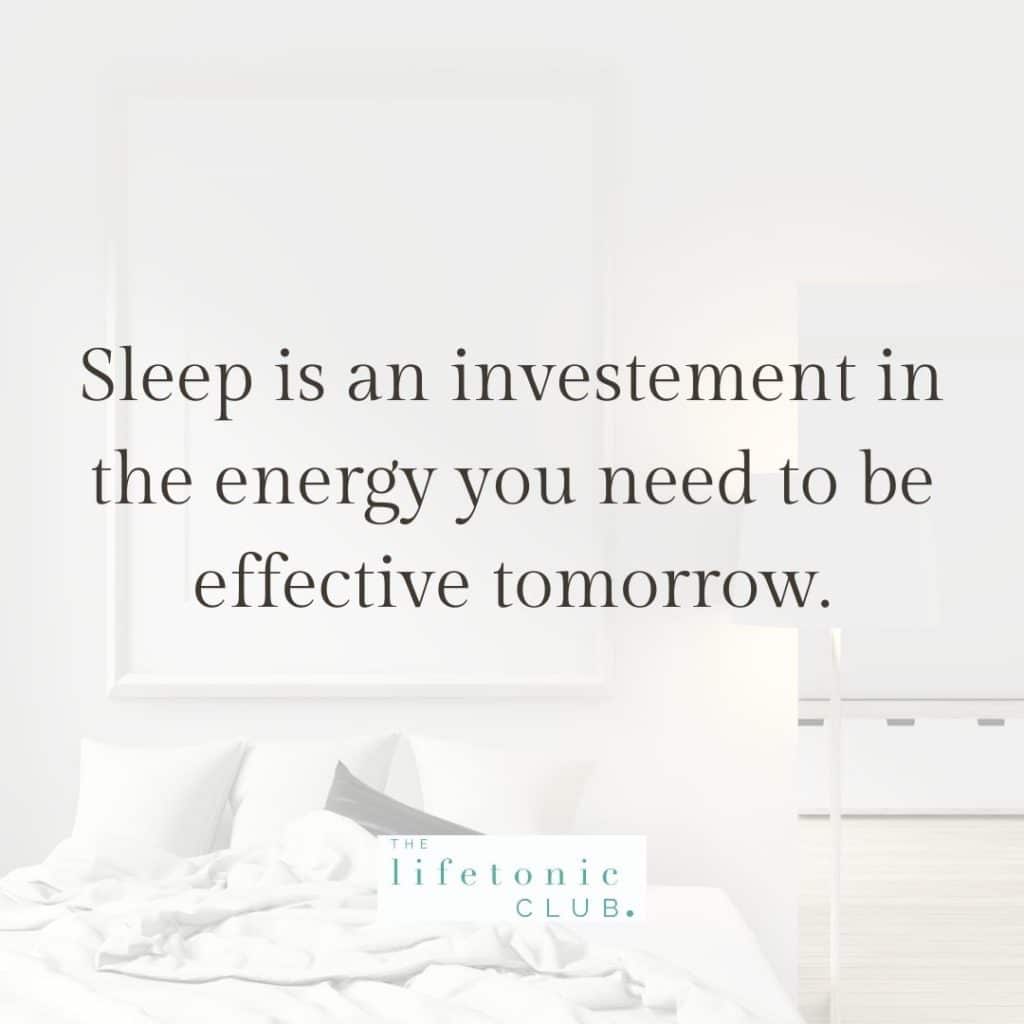
Restorative Sleep
How many hours of sleep did you get last night dear TLC-er?
According to Bupa, one in three adults in the UK suffer from poor sleep.
As a member, you know our top priority is taking care of our health – both physical and mental. And it’s easy to think that means things like managing what we eat and exercising, but true health encompasses so much more than that, which is why our Lifetonic focus for this month is on Sleep.
Just like regular exercise and a healthy diet, getting enough good sleep is an essential part of looking after your health. Here I’ll take a look at some of the health benefits of sleep and why it’s important to make sleep a priority.
And one of the best ways to care for your body and mind is by making sure you get enough quality sleep. Research shows that one of the BIGGEST factors in our overall health and well-being, as well as one of the BEST ways to lower our risk of disease, is getting restorative sleep.
Here’s just a few reasons why…
1. Improves your attention and concentration
It’s no surprise that getting a good night’s sleep can help to keep your energy levels up. But plenty of rest can also help to keep your mind from wandering and maintain your attention throughout the day.
Not sleeping properly can mean that both your body and brain don’t function properly the next day. It could impair your attention span, concentration, strategic thinking, risk assessment and reaction times. This is even more important if you have a big decision to make, are driving, or are operating any kind of machinery for your job. So getting plenty of sleep can help you to stay sharp and focused all day long.
2. Reduces stress levels
You know we’re big on that here in TLC!
There are lots of things that can cause you to feel stressed, and how you personally deal with stress will be different from someone else. But feeling stressed, for example from work, relationships, financial or health concerns, is often a key factor if you’re struggling to sleep at night. When you’re feeling stressed, your body releases ‘stress hormones’, for example cortisol, which can keep you awake. On the other hand, a good night’s sleep can have the opposite effect and relax the systems in your body that are responsible for this stress response.
Using your Wellbeing Checklist in your Little Book of Pilates Progress is designed to help you indentify any stressors your experiencing so as you can manage them.
3. Maintains good relationships
It’s no secret that a bad night’s sleep can leave you feeling grumpy. So making sure to get enough good sleep can help to put you in a more positive headspace. And when you’re feeling good, it’s likely to be felt by the people around you, like your colleagues and loved ones. So getting enough sleep can help you to maintain good interpersonal relationships.
Not only that, but how much sleep you get can affect your language, reasoning and communication skills – all key factors when building relationships with others.
4. Keeps your immune system strong
Getting a good night’s sleep can help to keep your immune system fighting fit and keep germs at bay. Sleep gives your body the time it needs to rest and repair, which is one of the reasons you feel tired and want to sleep more when you’re unwell. Sleep supports the proteins and cells of your immune system to detect and destroy any foreign invaders your body might come into contact with, like the common cold. It also helps these cells to remember these invaders, so if you come across the same bugs and germs again, you’re prepared to fight them off. So a good night’s sleep helps to strengthen your body’s immune response, and it’s essential to allow yourself time to rest and recover when you’re not feeling well..
5. Improved memory, creativity and focus
Not only does sleep allow your body the time it needs to rest, repair and rebuild, but it does the same for your mind too. As you sleep, your brain begins to organise and process all the information you’ve taken on during the day. It converts your short-term memories into long-term memories. This helps you to learn and means that when you wake up, you can often see things more clearly.
“Whatever dilemmas plague your brain long past bedtime, research proves you’re more likely to find your solution in slumber than in staying up past bedtime, when your brain functions less effectively and inventively.”
Our bodies and minds need to go through various stages of sleep each night. In fact, once we reach the third and fourth stages of sleep, also known as “deep” or “delta” sleep, our bodies are able to repair themselves, stimulate immune function and produce the energy we need for our awake hours. Once we enter the REM (Rapid Eye Movement) stage of sleep, our brains become more active and our learning and memory functions are also stimulated. We should be experiencing several REM cycles every night but we need to get through the other stages to reach REM sleep and that’s sometimes where we get stuck..
6. Taking care of your emotional wellbeing
If you’ve got a lot on your mind and are struggling with your emotions, going over things in your head can often keep you awake at night. If you’re up all night worrying, you might begin to see a change in your mood and a lack of sleep can leave you feeling low. This could then cause you to feel anxious and create more negative thoughts about not sleeping. This might keep you awake even longer and can turn into a vicious cycle of worry and poor sleep. A few simple stretches or one your Mindtonic Guided Relaxations can help you sleep and take care of your emotional wellbeing. Or try putting pen to paper and writing your concerns in a diary before bed. This could help put your thoughts in order and help you to get to sleep.
7. Better mental wellbeing
Remember, it’s not about being perfect – some things are out with our control like those of us who work shifts, babies not sleeping through the night and when we get sick ourselves – but it’s worth considering how you’re currently sleeping and what little steps or routines you can put in place to support better quality sleep as much as possible (i.e. going to bed instead of ‘just one more episode’ of your favourite Netflix series).

How To Sleep Better
If you’re having trouble sleeping, there are lots of things you can do to help you sleep better. Have a think about how and where you sleep and your sleeping habits. These are often called sleep hygiene measures.
It might be helpful to keep a diary of:
- the times you go to bed and wake up every day
- how long it takes you to get to sleep
- what activities you were doing before going to sleep
- if you wake in the night
- if you’re tired in the day
- everything you eat and drink in the day – and when
- what you’ve done during the day
- how much exercise you get in the day – and when
After doing this for around two weeks, you may notice a pattern or some bad habits around sleep and bedtime. You may be able to make some changes to your daily routine.
I’ve rounded up a few tips to help you here:
Bedroom environment
Check your bedroom is as comfortable as possible.
- Being too hot or too cold in the night can affect your sleep. The best temperature for sleep is 18 degrees, give or take a few degrees. So, adjust your heating and layer your bedding to find the right temperature for you.
- Lots of different noises – for example, street sounds and wildlife noises – can wake you in the night. Earplugs may help. If your partner snores, encourage them to seek medical advice.
- Your bedroom needs to be dark at night. Too much light can make it harder to sleep. You may need thicker curtains or blackout blinds if you’re blasted with sunlight in the morning, especially in the summer. ( i wear an eye mask on nights where i really struggle with sleep and it works wonders!)
Create a sleep zone and a nighttime routine
Only use your bedroom for sleep only. That means no work, tv or eating here as your brain struggles to differntiate that it’s time for rest. The light (especially blue light) and stimulation from electronic devices can activate parts of your brain and keep you awake. It can affect your body’s ability to produce the sleep hormone melatonin and disrupt your body’s natural sleep cycle.
- Go to bed and get up at about the same times each day, even on a weekend. It’s tempting to have a lie-in after a late night, but this will only make it harder for you to sleep the next night. This is because it resets your sleep cycle, so you need less sleep.
- Try not to nap during the day. But if you really feel you have to, keep it short (no more than 40 minutes) and don’t have a nap after 3pm.
- Establish a regular bedtime routine – this is just as important for adults as children. Take some time out to relax and wind down before you go to bed. Have a soothing bath, sit in a quiet place or read a book for at least half an hour before you go to sleep.
Relaxing
If you’re feeling stressed, try to deal with what’s causing your stress and worries during the day, rather than in the evenings. If you can’t stop thinking about everything going on in your life, it may help to journal before bedtime. When you’re struggling to fall sleep or you wake up in the night, write down your worries or the things you’re thinking about. This will help to organise your thoughts, rather than going over them in your head. Then you can deal with them the next day.
Practising relaxation techniques before going to bed may help by making you feel calmer. Try Mindtonic Library is designed for this. Reading or listening to relaxing music can also help.
If you really can’t sleep, don’t lie there worrying about it. If you don’t fall asleep within 20 minutes, get up and do something relaxing. But don’t turn on all the lights. Try reading or listen to some relaxing music or a podcast on guided meditation. Then go back to bed when you feel sleepy.
Limit caffeine and other stimulants
What you eat and drink, and when you do it, can affect your energy levels and how well you sleep. Try to limit caffinie, alcohol, sugary foods and heavy meals as they all have an impact on your ability to not just get to sleep, but fall into quality sleep.
Move your body regularly, even if it’s just 10 minutes
Regular exercise is a great way to help you sleep better. It helps to ease any stress and anxiety. Try exercising during the day or early evening and if you have trouble sleeping, don’t exercise after 7pm. Instead priortise stretching and relaxtion techniques like your Mindtonics or any of your Stretch and Relax pilates routines. They have all been designed to bring your mind and body together and easy you into relaxation mode so as sleep and rest come easily to you.
Think about how you feel when you don’t get enough sleep and how you feel when you do. For me I am short and snippy when i’ve not had enough sleep and also more prone to top up on coffee to keep myself going. On the contrary, when I do prioritise my sleep, I’m generally happier, more friendly, more creative and definitely more full of energy.
That’s it for this month. Make sure to pick one or two things you can add to your own self care toolkit this month and let us know in our Facebook Group how you’re going to be prioritising restorative sleep this month and don’t forget to download your Mindtonic as inspiration.
Have a great one!
